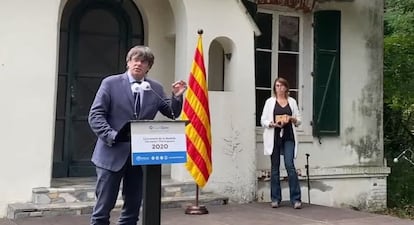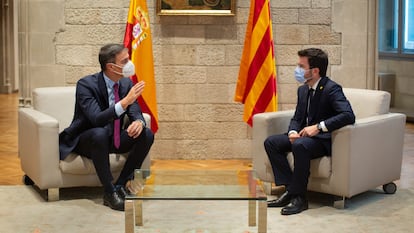Former Catalan premier Carles Puigdemont released by judge after arrest in Sardinia
The politician, who is also a Member of the European Parliament, has been living in Belgium since fleeing Spain to avoid detention for his role in the 2017 secession attempt. The Italian courts want to confirm whether or not he has immunity

The former Catalan regional premier, Carles Puigdemont, was arrested on Thursday in Sardinia (Italy). The politician had traveled there to attend a conference, according to his lawyer Gonzalo Boye and sources from his party Together for Catalunya (Junts per Catalunya).
Puigdemont was subject to an international arrest warrant issued by the Spanish Supreme Court for his role in the 2017 secession attempt in the northeastern region, which saw an illegal referendum held and the subsequent passing of a unilateral declaration of independence in the regional parliament. Puigdemont fled Spain to avoid arrest and had been living in Belgium ever since.
On Friday afternoon, the politician was released by an Italian appeals court, while questions are resolved as to whether the European arrest warrant against him is valid and also whether he currently enjoys immunity. Should the arrest be considered to be valid, the same court will have to decide whether to hand him over to the Spanish authorities. But this process could take up to 60 days. No one in Italy has so far been able to explain why the arrest warrant was not activated last week when Puigdemont arrived in Paris. Puigdemont was freed by the judge after making a statement, and there are no conditions on his release. He will have to appear before the court again on October 4.
Sources close to Puigdemont, who is also a Member of the European Parliament, explained that he had been approached by Italian police officers on his arrival in Sardinia. He was due to take part in a series of events this weekend, including APLEC Internacional - Adifolk, a Catalan popular culture festival, and he also had meetings planned with a number of Sardinian pro-independence mayors and municipal leaders.
He is calm and convinced that once more the Spanish justice system has deceived the European courts, by keeping some European arrest warrants active that should not have beenJordi Sànchez, secretary general of Together for Catalonia
According to legal sources, the Italian police were awaiting the arrival of Puigdemont, who was arrested as soon as he stepped off the aircraft. Puigdemont is being assisted by his lawyer, Gonzalo Boye, and a team of Italian attorneys.
The General Court of the European Union had on July 30 rejected a request of injunctive relief filed by Puigdemont and two other pro-independence leaders who had also fled Spain, Toni Comín and Clara Ponsatí, against the suspension of their immunity as MEPs. This decision left the three politicians without legal protection, after a decision taken by the European Parliament. But the court did not see any risk of arrest when it made that ruling, on the basis there was ostensibly no European arrest warrant in force.
Sources from the Spanish Supreme Court and public prosecutor told EL PAÍS that the arrest warrant “was never deactivated,” and as such was still in force, Fernando J. Pérez reports. Puigdemont’s lawyer referred to his arrest via his Twitter account, stating that the arrest was based on the European warrant issued in 2019, one that the attorney understood had been suspended.
The Italian authorities had detected the arrival of Puigdemont from Belgium thanks to the Passenger Name Record system, a program that collects information about passengers traveling in the European Union by air, and is used to detect the presence of wanted terrorists or other suspects, and was approved by the European Commission in 2016.
According to police sources, the PNR alerted the Italian authorities of Puigdemont’s arrival in Sardinia and the fact that there was an arrest warrant issued by the Spanish authorities against him. After this warning, the Italian police contacted their counterparts in Spain at around 7pm on Thursday, to inform them of Puigdemont’s imminent arrival and planned arrest.
Jordi Sànchez, the secretary general of Puigdemont’s Junts party, said during an interview on Catalan TV station TV3 that he had spoken to the former premier on Thursday night. “He is calm and convinced that once more the Spanish justice system has deceived the European courts, by keeping some European arrest warrants active that should not have been,” he said. “We hope that the Italian justice system heeds the European one.”
Effect on talks

The arrest of Puigdemont comes at a time when long-awaited talks between the Catalan government and the central government, led by Socialist Party (PSOE) Prime Minister Pedro Sánchez, had finally got underway. The government in the northeastern region is run by a coalition of the Catalan Republican Left (ERC) and Junts. However, the first meeting between politicians of both sides was not without controversy, after ERC premier Pere Aragonès opted to exclude Junts from the talks as they presented interlocutors who were not Cabinet members.
To complicate the political situation further, Sánchez leads a coalition government with junior partner Unidas Podemos, and does not enjoy a parliamentary majority in the Congress of Deputies. This means that he relies on votes from smaller parties, including ERC, in order to pass legislation in Spain’s lower chamber.
Ahead of these talks Sánchez took a controversial decision to pardon the pro-independence leaders who had been tried and convicted by the Supreme Court for their role in the 2017 independence drive. The jailed politicians and civil leaders included the leader of the ERC and former deputy premier of the region, Oriol Junqueras.
ERC votes will be key for the Spanish government to approve its budget plans later this year, and in recent days Junts has conveyed messages suggesting it is willing to negotiate the budget too. However, it is unclear whether the different factions within the party are acting in unison. One of the points of conflict for Junts relates to a planned Audiovisual Law, which does not include protection for official languages such as Catalan for content on streaming platforms such as Netflix and HBO. Junts wants there to be some kind of quota to guarantee that content can be broadcast in Catalan. ERC backs this demand, but understands that the law is still in a very early stage and is subject to changes, Miquel Noguer reports.
Puigdemont and his colleagues have been the main thorn in the side of ERC and the PSOE until now in efforts to define the future of Catalonia. His party, Junts, has repeatedly used the European stage as a pulpit to paint Spain as a state that doesn’t respect political rights and has also sought to undermine the credibility of any proposal from the central government aimed at reducing tensions with Catalonia. On Thursday night, Junts leaders took to social media to point the finger at Pedro Sánchez and Unidas Podemos as being responsible for the arrest of Puigdemont.
For its part, the central government released a statement in the early hours of Friday morning saying that Puigdemont’s arrest was due to an ongoing judicial procedure that “applies to any European Union citizen who must answer for their actions before the courts.” The executive, the statement continued, “respects the decisions of the Italian authorities and courts,” adding that the former premier must “be subject to the actions of the justice system just like any other citizen.”
This is not the first time that Puigdemont has been arrested since he fled Spain to Belgium. In March 2018, he was detained in Germany when traveling by car to his residence in Waterloo after having gone to Helsinki, Finland to attend a conference. He was held in a German prison in Neumünster, before being released 12 days later. Subsequently, a German court rejected his extradition to Spain, which was seeking to put him on trial on accusations of rebellion, and Puigdemont returned to Belgium.
The leader of the main opposition Popular Party (PP), Pablo Casado, published a message on Twitter calling on Puigdemont to be tried in Spain for his “coup against constitutional law,” and demanded that Sánchez commit to “respecting the justice system’s sentence without pardons aimed at keeping himself in power.”
The National Catalan Assembly (ANC), a pro-independence civil organization, staged a protest on Friday morning in Barcelona on the basis it considers the arrest to be illegal. Junts and ERC backed the demonstration.
English version by Simon Hunter.
Tu suscripción se está usando en otro dispositivo
¿Quieres añadir otro usuario a tu suscripción?
Si continúas leyendo en este dispositivo, no se podrá leer en el otro.
FlechaTu suscripción se está usando en otro dispositivo y solo puedes acceder a EL PAÍS desde un dispositivo a la vez.
Si quieres compartir tu cuenta, cambia tu suscripción a la modalidad Premium, así podrás añadir otro usuario. Cada uno accederá con su propia cuenta de email, lo que os permitirá personalizar vuestra experiencia en EL PAÍS.
¿Tienes una suscripción de empresa? Accede aquí para contratar más cuentas.
En el caso de no saber quién está usando tu cuenta, te recomendamos cambiar tu contraseña aquí.
Si decides continuar compartiendo tu cuenta, este mensaje se mostrará en tu dispositivo y en el de la otra persona que está usando tu cuenta de forma indefinida, afectando a tu experiencia de lectura. Puedes consultar aquí los términos y condiciones de la suscripción digital.








































